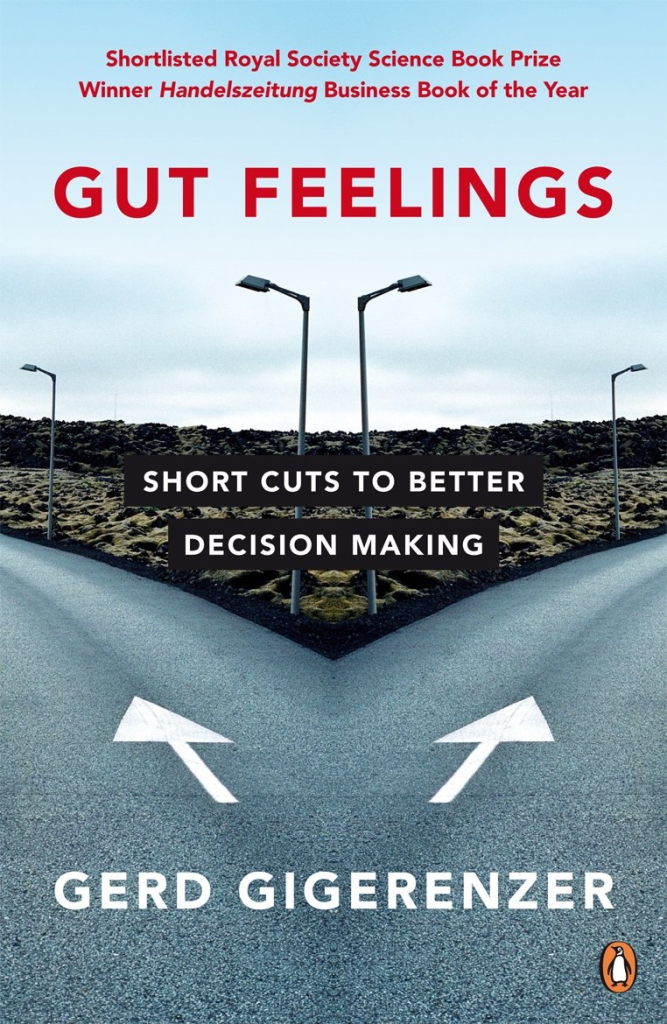Gut Feelings by Gerd Gigerenzer
Gut Feelings by Gerd Gigerenzer is an enlightening exploration of the power of intuition in our decision-making processes. Gigerenzer challenges the conventional belief that rationality requires thorough analysis, arguing instead that evolved heuristics allow us to make smart, fast decisions, often better than more complex calculations. The book’s insights apply broadly, from daily choices to high-stakes decisions.
Who May Benefit from the Book
- Decision-makers in business, health, or education
- Individuals seeking to improve quick-thinking skills
- Readers interested in psychology and human behavior
- Those who prefer instinctive decision-making over deep analysis
- Professionals in high-pressure roles where quick choices are critical

Top 3 Key Insights
- Intuition Is Intelligent: Gut feelings aren’t random impulses but informed judgments based on experience and evolved brain functions.
- Less Is Often More: Simple rules of thumb can outperform complex analysis, especially in uncertain environments.
- The Power of Recognition: Partial ignorance can be useful; recognizing fewer options can sometimes lead to better decisions.
7 More Lessons and Takeaways
- Environmental Adaptation: Intuition’s success relies on how well it’s adapted to the environment; instincts work best in familiar contexts.
- Simplicity in Complexity: Simplified decision-making frameworks can be more effective than comprehensive models in uncertain scenarios.
- The Recognition Heuristic: Knowing less can be an advantage; often, the option you recognize is superior.
- Single-Reason Decisions: One well-chosen factor may outperform complex, multi-factor analysis in high-uncertainty situations.
- Heuristics and Rationality: Heuristics are powerful, context-based shortcuts that allow effective decision-making.
- Moral Instincts: Social and family instincts shape our moral choices, guided by simple yet impactful rules.
- Role of Imitation: Mimicking others helps acquire essential behaviors quickly, fostering social cohesion and cultural continuity.
The Book in 1 Sentence
Gut Feelings argues that our intuitions, shaped by evolution, can guide better decisions than complex analysis in uncertain scenarios.
The Book Summary in 1 Minute
In Gut Feelings, Gigerenzer argues that intuition, often dismissed as irrational, is actually an evolved form of intelligence. By harnessing unconscious rules of thumb, or heuristics, our gut feelings make quick, frugal decisions that often surpass in-depth analysis. Key insights include the power of simplicity and recognition heuristics, where knowing less can help us make better choices. The book underscores that these “fast and frugal” decisions are optimized by evolution, making them efficient and effective in real-world situations, from healthcare to investing.
The Book Summary in 10 Minutes
Heuristics and Rationality: Rethinking Decision-Making
Gerd Gigerenzer challenges traditional ideas of rationality, suggesting that intuition, or “gut feelings,” often leads to better decisions than detailed analysis. This shift from a rational, calculated approach to a more instinctual one opens doors to a fresh understanding of human decision-making.
Intuition Is Not Impulsive but Intelligent
Heuristics, or mental shortcuts, allow for rapid decisions by focusing on the most relevant information. Gigerenzer argues that gut feelings aren’t impulsive but represent intelligence tuned over generations to make quick judgments with limited data. For example, a person might decide to invest in a well-known brand based on recognition, a reliable indicator of value.
Environmental Adaptation: Fitting Intuition to Context
Our intuition functions best in environments it’s adapted to. When decision-making aligns with environmental patterns, it’s more accurate. A simple heuristic that helps a hunter-gatherer survive may not work in financial markets. Gigerenzer suggests that to harness intuition effectively, we should first understand our environment’s structure.
The Power of Less Information
Gigerenzer challenges the belief that more information always leads to better decisions. Information overload can overwhelm our cognitive capacity, while simplicity can enhance accuracy, especially under uncertain conditions. In medical settings, quick decision trees can outperform comprehensive diagnosis models, especially under time pressure.
| Decision Context | Effectiveness of Heuristics |
|---|---|
| High-stakes situations | Outperform detailed analyses |
| Time-sensitive environments | More effective than complex models |
Recognition Heuristic: Leveraging Limited Knowledge
The recognition heuristic is rooted in “less-is-more” logic. In situations where we recognize one option but not another, that recognition often indicates higher quality. This is particularly effective in domains like consumer behavior, where brand familiarity can guide quick and generally reliable choices.
Moral and Social Instincts: Gut Feelings in Society
Gigerenzer delves into moral intuition, noting that we often rely on gut feelings shaped by social and family instincts in moral decisions. These instincts help us navigate complex social scenarios with a few crucial cues. For instance, our moral judgments in the context of family and community are anchored in evolved principles.
One-Reason Decision Making: Prioritizing Relevance
One-reason decision-making uses a single key factor to simplify choices. For example, a doctor might prioritize one specific symptom when diagnosing a patient, bypassing exhaustive analysis. This “Take the Best” heuristic often rivals more detailed models in effectiveness.
About the Author
Gerd Gigerenzer is a prominent German psychologist specializing in decision-making and heuristics. As Director of the Center for Adaptive Behavior and Cognition at the Max Planck Institute for Human Development, he has pioneered research in “fast and frugal” heuristics. Gigerenzer’s work spans applications in medicine, law, and finance, where he advocates for intuitive decision-making processes. His writings have made complex psychology accessible, emphasizing how evolved instincts shape human choices.
How to Get the Best of the Book
To maximize this book’s insights, focus on understanding when and where your intuition performs best. Test the heuristics in real-life situations to recognize the contexts in which they excel, building trust in your gut reactions.
Conclusion
Gut Feelings provides a refreshing look at decision-making, advocating for the power of intuition over exhaustive analysis. Gerd Gigerenzer reveals how fast, instinct-driven decisions can outperform complex strategies, particularly in uncertain contexts. This work will resonate with readers eager to trust their instincts while understanding the science behind gut feelings.


